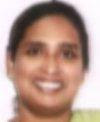Total earnings per month - Rs 1500. Members in this Dhangar family - seven. Three are orthopaedically disabled and two chronically ill and old. Average cash in hand that each member has in a day is Rs 7. How much can they possibly spend on food, clothing and medicines? PREETU NAIR travels to Latambarcem (Bicholim taluka) and discovers that beyond the feel-good factory, there is a house where there is a surplus of hunger but no food or hope. This is not the whole story but a window to many such families in the state who live below the poverty line, under similar conditions.
LATAMBARCEM (BICHOLIM TALUKA): Jani Singadi's pain and intensity are real. At 65-plus, she has no relief. Her family is swamped by a crisis of many layers: three orthopaedically disabled sons, surplus of hunger, no money, an illegal house gifted by a few philanthropists, rising debt, etc. Probably, a symptom of a much deeper rural distress.
It is difficult to talk with Jani. And even more difficult to apprehend her pain. She talks, coughs, cries, takes a deep breath and talks again, coughs … the pattern continues. To put it simply, they are landless people from the Dhangar community, who don't even have the "normal" avenues of work. She has six sons but three of them are orthopaedically disabled. Her 80-plus husband is blind and the couple suffers from chronic ailments.
Collapse of hope has broken up the family and their 23-year-old son Sonu, tired of the unending turmoil and sufferings, left his ill parents and three orthopaedically disabled brothers in search of better livelihood options. The only earning member in the family is 27-year-old Rama, a daily wage worker, who if lucky to get some work in a mining unit, earns Rs 60 a day. Her 16-year-old son is the only literate person in the family. He is studying in standard IV in an adjacent government school. After school, he rushes back home to work as a shepherd in the neighbourhood. He tends goats and in return earns around 5 kg raw rice in a month for his family.
So fragile is their economy and equilibrium that more than often they have less than one square meal a day. For clothing, per member has just two shabby and somewhat worn out items . But then what do you expect when the household spends less than Rs 220 a month per person. What can they afford if the most they can spend is, on an average, Rs 7 a day? How much can they possibly spend on food, clothing and shelter?
Every moment spent there is instructive as you are forced to think about how they live and on what is it that they live. When GT-Weekender visited the family it was 1 pm on a Sunday afternoon. The family had no rice to cook. When asked if the family was waiting for the elder son to get some groceries, Jani starts crying inconsolably. Seeing her cry, Rajendra, 20, who looks and behaves like a five -year-old started screaming, "Don't make my mother cry. Please, don't make my mother cry."
The plight of the family makes a deep impact and you understand the acute distress that the family is undergoing. The scenes from the family expose two different rules and realities: the urban rich and rural poor of Goa. This, despite the fact that the government has various schemes for the welfare of disabled and elderly citizens, besides policies for the people living below poverty line.
Though they possess a ration card and had applied for the benefits under BPL, unfortunately their name still doesn't figure in the BPL list.
And although their suffering is certified as genuine by the Social Welfare Department, which has issued a card stating that three children - Tukaram (22), Rajendra (20) and Laxman (11) - are orthopaedically disabled, they are yet to get financial assistance under the Dayanand Social Security Scheme.
It is not that the family has not tried. "We have applied several times and still keep sending several reminders to the Social Welfare Department, but to no avail," revealed Jani. What is still worse is that the semi-pucca house gifted to them by few philanthropists is illegal, while their thatched roof house, bearing number 7 in survey number 557, at Balachi Bhand (Latambarcem Comunidade) collapsed on June 26, 2006 due to the heavy rains.
"It is terrifying. What if we are forced to vacate this house? What will we do," Jani said. The already shattered family is now being troubled by the landlord, as their new house is illegal. "We lodged a police complaint. For sometime, things were fine. But again the threats have started and there is no one to protect us. There's nowhere to go. And we cannot afford to even rebuild a hut with a thatched roof," added Jani.
After years of waiting for government relief, their world has turned fragile and all government assurances of improving their living conditions seem meaningless. This is reality; a deepening but harsh rural nightmare.
But there is another reality, which is a huge lesson in humility: Even though they themselves are on the verge of starvation, they still made it a point to offer this reporter black tea.
Monday, October 16, 2006
Subscribe to:
Post Comments (Atom)







No comments:
Post a Comment